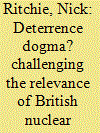|
|
|
Sort Order |
|
|
|
Items / Page
|
|
|
|
|
|
|
| Srl | Item |
| 1 |
ID:
093081


|
|
|
|
|
| Publication |
2009.
|
| Summary/Abstract |
This paper emphasizes the pertinence of the British government's claim that nuclear deterrent threats are still relevant in the four broad areas to which it addresses: deterrence against aggression towards British/NATO vital interests or nuclear coercion/ blackmail by major powers with large nuclear arsenals; deterrence against nuclear coercion or blackmail with other WMD by regional ''rogue'' states; deterrence against state-sponsored acts of nuclear terrorism; and as a general residual deterrent function to preserve peace and stability in an uncertain world.
British nuclear weapons are still important and very much relevant in all the four areas discussed. First of all, they play a role of a significant tool of political leverage as they continue to serve as an authentication of British military capabilities. In that regard, they still function much the same way they did during the 'Cold War'. WMDs were, after all, a guarantee of their non-use, which does not mean that they were not useful. Secondly, it also authenticates the UK among its allies. Even though generally democracies do not wage wars with one another, they still have to face the challenges posed by non-democracies. In doing so, they need to support each other with the use of 'ultima ratio' arguments in order to safeguard international peace and stability. The British nuclear deterrent should, therefore, be perceived as a general deterrent with a positive influence on international community and international security, overall.
|
|
|
|
|
|
|
|
|
|
|
|
|
|
|
|
| 2 |
ID:
108414


|
|
|
|
|
| Publication |
2011.
|
| Summary/Abstract |
NATO has been a source of influence on British nuclear policy and strategy since the 1950s. The nature and extent of its influence has, however, been kept limited by successive British governments. This article considers how and why this has happened. It discusses evolving British attitudes towards NATO command and planning, and shows how these were reflected with regard to strategic nuclear issues from the late 1950s. The evolution of the key notion that the United Kingdom is a second centre of nuclear decision within NATO is traced, and both its utility and contradictions are examined. Overall it is argued that, both during and since the Cold War, NATO has neither been a central factor in shaping British nuclear strategy and policy, nor have British nuclear weapons been other than of limited importance and relevance for most NATO members.
|
|
|
|
|
|
|
|
|
|
|
|
|
|
|
|
| 3 |
ID:
181753


|
|
|
|
|
| Summary/Abstract |
The UK’s 2021 Integrated Review of Security, Defence, Development and Foreign Policy states that the UK will no longer give public figures for its operational nuclear weapons stockpile, deployed warheads or deployed missiles, ending previous policies on transparency. Accurate accounting for historical holdings of nuclear weapons will likely be of importance in any future verifiable nuclear disarmament treaty. The National Archives provide details on the UK’s historical stockpile and its composition, and in this article John R Walker makes an initial tentative estimate of the UK’s annual holdings by weapon type between 1953 and 1977.
|
|
|
|
|
|
|
|
|
|
|
|
|
|
|
|
| 4 |
ID:
086942


|
|
|
|
|
| Publication |
2009.
|
| Summary/Abstract |
In December 2006 the British government released a White Paper announcing its intention to begin the process of replacing its current Trident nuclear weapons system, thereby allowing it to retain nuclear weapons well into the 2050s. In March 2008 the government released its National Security Strategy that stressed the long-term complexity, diversity and interdependence of threats to British security with a clear focus on human rights, justice and freedom. This article asks how the threat to kill tens if not hundreds of thousands of people with British nuclear weapons fits into the National Security Strategy's world view and questions the relevance of an instrument of such devastating bluntness to threats defined by complexity and interdependence. It argues that the government's case for replacing the current Trident system based on the logic of nuclear deterrence is flawed. First, Britain faces no strategic nuclear threats and the long-term post-Cold War trend in relations with Russia and China-the two nuclear-armed major powers that could conceivably threaten the UK with nuclear attack-is positive, despite current tensions with Moscow over Georgia. Second, the credibility and legitimacy of threatening nuclear destruction in response to the use of WMD by 'rogue' states is highly questionable and British nuclear threats offer no 'insurance' or guarantee of protection against future 'rogue' nuclear threats. Third, nuclear weapons have no role to play in deterring acts of nuclear terrorism whether state-sponsored or not. Fourth, British nuclear threats will be useless in dealing with complex future conflicts characterized by 'hybrid' wars and diverse and interdependent sources of insecurity. The article concludes by arguing that the government's fall-back position that it must keep nuclear weapons 'just in case' because the future security environment appears so uncertain, makes no sense if British nuclear threats offer no solution to the causes and symptoms of that uncertainty.
|
|
|
|
|
|
|
|
|
|
|
|
|
|
|
|
|
|
|
|
|